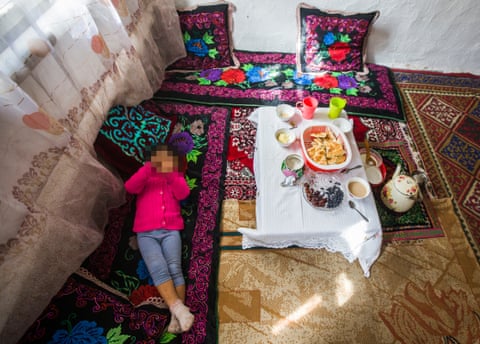For more than a year, *Farkhad, 39, has lived with the uncertainty that his wife Mariam may be dead. *Mariam, 31, was visiting her hometown of Artush in Xinjiang, northwest China, in March 2017 when she sent a frantic message to Farkhad that police were taking her away.
Over the next month, she messaged sporadically on WeChat from inside what appeared to be a detention centre. In April she said she was being transferred to another facility. Farkhad, who calls his wife Jenim (My soul), wrote back: “My soul, what can I do?”
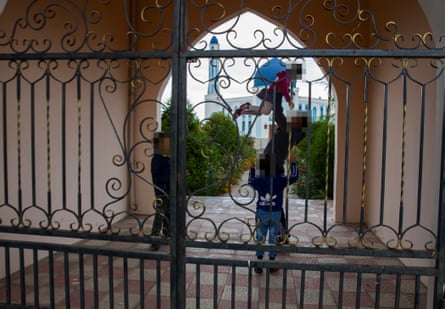
“Don’t do anything. Don’t come to China. Don’t look for me,” she said. Their last conversation was in June 2017, when Mariam messaged from a hospital. She had fainted twice in the new detention centre. Farkhad, now the sole carer of the couple’s three children, is desperate for news of her.
Mariam, an ethnic Uighur from China, is one of an estimated 1 million Muslim minorities – Uighurs, Kazakhs, Hui, Uzbeks and others – detained in a network of internment camps in the north-western Chinese territory of Xinjiang.
The camps are part of China’s “strike hard” campaign that is alleged to use extrajudicial detentions, surveillance, political indoctrination or “re-education”, torture and abuse to root out extremist elements, according to a growing body of evidence that includes witness accounts, media reports, government documents and satellite images. A US congressional commission on China called it the “the largest mass incarceration of a minority population in the world today”.
Beijing’s restrictive policies in Xinjiang, which began after a series of ethnic riots in 2009 and have increased since 2016, are coming under global scrutiny. The UN has called on China to release all those detained on the “pretext of countering terrorism”. The US is reportedly considering sanctions against Chinese officials involved in the campaign, while the Malaysian politician Anwar Ibrahim, has called for formal talks with China over the issue.
China denies allegations of persecution and claims all measures are to improve stability and solidarity in the country’s far west, home to about 12 million Muslim minorities. “China protects the religious freedoms of its people. All ethnic groups in China enjoy full religious freedom, according to the law,” Geng Shuang, a spokesman for the foreign ministry, said at a press briefing on Wednesday.
Outside of Xinjiang, the effects of the crackdown are felt most keenly in neighbouring Kazakhstan, home to large Uighur and Kazakh communities who have for years travelled back and forth between Xinjiang and Kazakhstan.
Here, families are reeling as they search for scraps of information about their loved ones missing in China. Others express a mixture of guilt and helplessness as they learn, from what little information comes out of Xinjiang, of the grim reality just across the border.
Kazakhstan is also the site of a growing pocket of protest against what is seen as a state-sponsored campaign to erase minority cultures in China through mass detentions, intimidation, and forced assimilation with the dominant Han Chinese.
“The Chinese communist party wants to create ‘One people, one country, where there are no Uighurs, Kazakhs or Uzbeks … just Chinese,” said Ilshat Iminov, an activist in Almaty.
Others are collecting hundreds of testimonies from families whose relatives have disappeared in China and former detainees have begun to talk about their time in the camps.
‘There is no way out’
*Guli, 23, was picked up by police in a park in Urumqi in June and sentenced to 15 days in a detention centre for not having her ID with her. Local authorities had previously interrogated her, citing reports that she wore a hijab and prayed.
She describes to the Guardian a long, single-storey building that held about 230 women. Inside, the women were required to sing patriotic songs for two hours on most days, memorise a 10-point disciplinary code and undergo self-criticism sessions. At night, the inmates took turns monitoring each other to make sure no one covered their faces or turned their back to the cameras mounted on the wall.
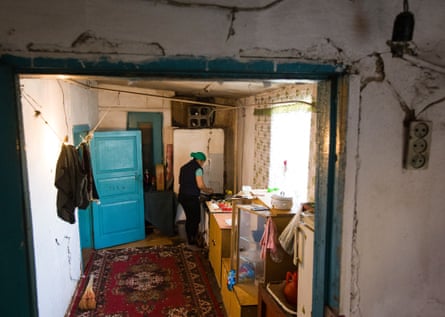
Most of the women were Uighur or Kazahk, and a few were Han Chinese. One woman told Guli she was there because police had found a “happy Eid” message on her phone. Another had been there for 10 years.
Guli did not experience any physical abuse but the psychological pressure was intense. The guards regularly told her she would be imprisoned for another six months. They shouted at the inmates for speaking, approaching a window, or not speaking in Chinese. Guli remembers a woman in the cell across from hers whose hands were chained to her feet for four days.
Guli, who was released after serving eight days of her sentence and sent back to Kazakhstan, believes that what she witnessed was just the tip of the iceberg. “I have only seen a small part … there were a lot of people who had been there much longer and I hope telling my story will help end their suffering sooner,” she says.
Other former detainees tell of how they were sent to re-education camps where inmates were made to learn Chinese, pledge allegiance to the communist party, and follow a strict military-style regimen.
Kairat Samarkand, a Muslim Kazakh who was in a re-education camp outside of Karamagay in northern Xinjiang for almost four months this year, said he was forced to wear a contraption known as “iron clothes,” an outfit of iron claws and rods that left him immobile in a star position. One day, he was made to wear it for 12 hours after he refused to make his bed.

Samarkand said the inmates were not told outright to renounce their religion, but the meaning was clear. “They would say, there is no religion. The government and the party will take care of you,” he said.
Before each meal the detainees had to thank the Chinese president, Xi Jinping. They were required to learn the top Chinese leaders’ names by heart and recite patriotic songs. “If there were no party, if there were no Xi Jinping, there would be no country,” went one chant. Samarkand was allowed to leave the camp after he attempted suicide.
Another ex-detainee, who did not want to be named, said he was shocked by what he saw when he was sent to a re-education camp earlier this year. “I had heard and I knew, but I was stunned,” he said.
He recalls being locked in classrooms and monitored by guards during study sessions. Elderly detainees in his camp were told they had to learn more than 3,000 Chinese characters before they could leave. In the two months he was there, he did not see anyone released. Most inmates hoped to be freed in a year or two. As a Kazakh citizen, he was eventually allowed to leave.
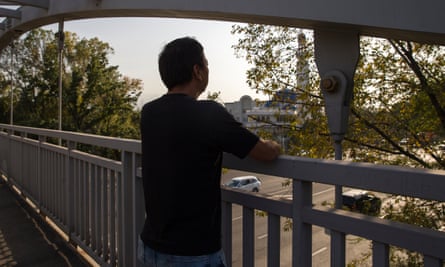
“There is no way of getting out. You go into the camps, but there is no way out,” he said. Now in Kazakhstan, he still fears for his family in Xinjiang, and retribution for speaking out. “If I go to China, they will kill me,” he says.
Up to 1.1 million people, or about 10% of Xinjiang’s adult Muslim population, have been detained in re-education camps, according to estimates by the NGOs Chinese Human Rights Defenders and Equal Rights Initiative.
In a recent Human Rights Watch report, former detainees at the internment camps recounted being shackled to beds or chairs, subjected to sleep deprivation, as well as beaten and hung from ceilings and walls. Residents in Xinjiang described excessive security checks, mass surveillance, and the constant threat of being arrested or sent to a camp.
“The situation in Xinjiang is unprecedented because of the breathtaking range of human rights abuses that are taking place,” said Maya Wang, a senior China researcher at Human Rights Watch.
‘We can’t ask, and they can’t say’
In Kazakhstan, where many have family in China or grew up there before moving across the border as part of a repatriation programme, the situation in Xinjiang is nothing short of a crisis.
Atazhurt, a local organisation that advocates for ethnic Kazakhs detained in China, says it gets between 20-30 requests for help every day from people whose relatives have been detained, arrested, or barred from leaving China. The group is dealing with more than 1,000 cases.
During recent interviews with researchers from Amnesty International, more than 100 people showed up clutching documents and photos of their missing relatives. Those detained include parents, grandparents, siblings, children and partners. In one case, a family was searching for news of a 13- year-old girl believed to have been sent to a re-education camp.
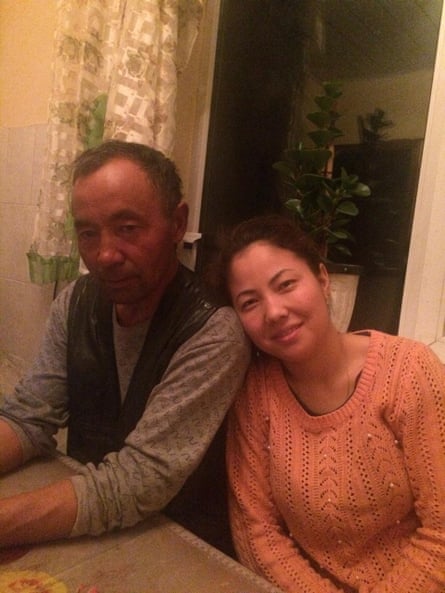
Bota Kussaiyn, 26, is trying to find her 58-year-old father, Sagymubai, who was sent to a re-education camp last December while visiting his hometown in Emin county in Xinjiang, according to relatives. Right before he left, he suggested they get a family portrait done, their only one.
“My first feeling is regret. My father shouldn’t have gone to China. The second is fear … I’m afraid he may never return,” Kussaiyn said. She gave her and her father’s real names, despite the possibility of retribution, in hopes of drawing attention to his case.
Residents in Kazakhstan say they cannot contact relatives and friends in China because the simple act of talking on the phone is enough to land them in an internment camp. Kazakhstan is one of 26 countries, including Russia and Turkey, that have been flagged as “sensitive” by Chinese authorities, according to Human Rights Watch.
“What China is doing is the complete isolation of Xinjiang from ties abroad,” said Kakharman Kozhamberdi, an advisor for the World Uyghur Congress in Kazakhstan.
Still, families communicate how they can. A Kazakh woman living in Almaty recently learned her brother in Xinjiang had been detained. She asked not to be named for fear of making the situation worse for him. A friend, calling from China, told her: “I haven’t seen yours in a while. I think they may be at school,” code for detention in a re-education camp.
“We can’t ask, and they can’t say,” her daughter-in-law says, explaining why they do not use names or speak more specifically. “We can only say: ‘How are ours?’”
In response to questions about missing relatives in Xinjiang, a spokeswoman for China’s ministry of foreign affairs said: “Regarding the people you asked about, we do not know.”
‘My soul, where are you?’
Farkhad still messages his wife, even though she does not answer. “How are you, my soul? My battery died,” he wrote a few hours after his wife’s last message in June 2017. “Is everything all right? We miss you very much,” he messaged in December. Later that month: “My soul, where are you???” His last message was on 8 June, almost a year since they last spoke. “Please answer. We are worried about you … We will keep and remember you for ever.”
In August, Farkhad drove three hours to Khorgas, on the border of Kazakhstan and China, where Chinese shops have set up in a freetrade zone. He wants to borrow a phone with a Chinese SIM card to call his wife’s family in Xinjiang. They have stopped answering his calls, probably because they come from a Kazakh number.
Four Kazakh store clerks refused before a Chinese man agreed to lend his phone. Farkhad called his father-in-law and they spoke for a few minutes. He hung up and shook his head slightly.
The news was bittersweet. His father-in-law is ill and has not been able to speak with Mariam’s mother, also “at school”, for months. But he has been able to talk to Farkhad’s wife, his daughter, once a week. She is fine, he says.
On the drive home Farkhad is jubilant. “I always felt in my heart she was alive,” he says. “She left for what was supposed to be 10 days and disappeared for two years. When she comes back I’m never letting her leave.”
* Name has been changed to protect the identity of the interviewee
Additional reporting by Naubet Bisenov
